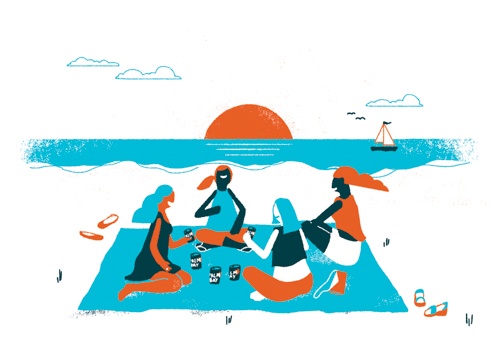 Amélie Tourangeau
Amélie Tourangeau
The Still Waters of the St. Lawrence
When I was fourteen, I skinned my knee rollerblading. It was summertime, and I was eager to get down to the lakeshore near my house in Lachine, a suburb along the southern edge of the island of Montreal. I had successfully navigated my pothole-laden street only to tumble as soon as I reached the smooth, paved bike lane that flanks the shore.
Even from the ground, everything looked as calm as ever. A few tall pine trees swayed in the wind; the water from Lac St. Louis lapped placidly against the rocks on the shoreline. I remember being surprised at how many different shades of red erupted from the wound on my leg. The worst part, though, was that I had ruined my favourite jeans: one clean rip across the left knee.
For Proust, eating a madeleine was enough to be transported back to a different time and place, but some memories you can’t access from a distance. I forgot about my bloodied knee until I was back in the exact spot where it happened. Every time I go back to the lakeshore, something like that will resurface: too small to carry around in my real life, not small enough to disappear entirely. A sound, a smell, the twisty feeling I got in my stomach when I fought with my best friends in grade five. Out of nowhere, I can recall the ideas I had as a child about who I was going to be, like something cast away long ago that comes bobbing back through the water, improbably preserved.
Lachine is boring. The small suburb is nestled uncomfortably between the anglophone heterogeneity of the West Island and the hip, metro-accessible boroughs of Verdun and NDG. I moved out of my parents’ house as soon as I could afford to. It’s not really a place worth knowing about, I explain apologetically to people in Toronto who ask what part of Montreal I’m from. The metro doesn’t even go out there.
But the lakeshore has always been special. A few decades ago, before I was born, Lachine began buying up and demolishing old buildings along its waterfront. It started in the fifties, when the passage of new laws forbade anything new from being built on the south side of St. Joseph Boulevard, and several old buildings in the borough’s industrial east end were torn down. But the bulk of the work was done in the 1970s, under mayor Guy Descary, who wanted more parks for the city’s residents. One of the last houses to go, an elegant two-storey with a private tennis court, was torn down in the late nineties; its stained-glass windows were sold off one by one. Now, anyone can walk along the water on paths that stretch from Lachine’s western border with Dorval all the way into Old Montreal.
Unlike the rest of Lachine, the lakeshore is beautiful enough to draw visitors. It’s comfortingly vast, and the sky is never quite as vivid anywhere else in the city. My friends and I played there as kids, and as teenagers, we snuck beers out of the fridge and drank them at a spot where the shore juts out towards the water. We shared secrets in what used to be someone’s backyard, creating private memories in a newly public space.
The last time I was home, I met up with two old friends for a walk by the lake. We took the path that winds along the waterfront, past the houses where we grew up, past palatial homes and modest apartment blocks. Someone had set up a drum kit dangerously close to the shoreline, the drummer mostly obscured by tall reeds. Cyclists whizzed by. We passed the spot where I skinned my knee at fourteen, where you can see a tiny, uninhabited island just off the shore, its tangled mess of green branches bound up, in my memory, with a pair of torn jeans.
We’d only been out a few minutes when we ran into some girls we knew, a pair of twins. They had been our best friends in elementary school, and then, later on, the sworn enemies of another friend. Now they’re just people we knew when we were young. They were stretched out on a big blue blanket, shoes off, drinking cans of Palm Bay. We performed a ritualistic catch-up dance: Oh, you’re getting married? Congratulations! What’s he like? I’m living in Toronto, it’s great, but there’s something about home, you know?
While we talked about how much things have changed, the sound of the water against the rocks reminded us that nothing had, not really.





